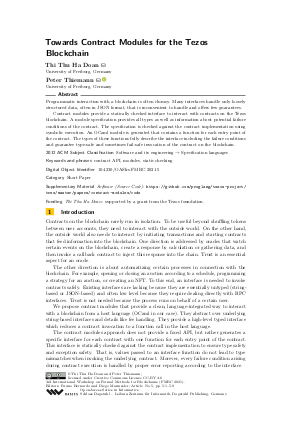Towards Contract Modules for the Tezos Blockchain (Short Paper)
Authors
Thi Thu Ha Doan,
Peter Thiemann 
-
Part of:
Volume:
3rd International Workshop on Formal Methods for Blockchains (FMBC 2021)
Part of: Series: Open Access Series in Informatics (OASIcs)
Part of: Conference: Workshop on Formal Methods for Blockchains (FMBC) - License:
 Creative Commons Attribution 4.0 International license
Creative Commons Attribution 4.0 International license
- Publication Date: 2021-11-30
File

PDF
OASIcs.FMBC.2021.5.pdf
- Filesize: 0.52 MB
- 9 pages
Document Identifiers
Subject Classification
ACM Subject Classification
- Software and its engineering → Specification languages
Keywords
- contract API
- modules
- static checking
Metrics
- Access Statistics
-
Total Accesses (updated on a weekly basis)
0PDF Downloads0Metadata Views
Abstract
Programmatic interaction with a blockchain is often clumsy. Many interfaces handle only loosely structured data, often in JSON format, that is inconvenient to handle and offers few guarantees. Contract modules provide a statically checked interface to interact with contracts on the Tezos blockchain. A module specification provides all types as well as information about potential failure conditions of the contract. The specification is checked against the contract implementation using symbolic execution. An OCaml module is generated that contains a function for each entry point of the contract. The types of these functions fully describe the interface including the failure conditions and guarantee type-safe and sometimes fail-safe invocation of the contract on the blockchain.
Cite As Get BibTex
Thi Thu Ha Doan and Peter Thiemann. Towards Contract Modules for the Tezos Blockchain (Short Paper). In 3rd International Workshop on Formal Methods for Blockchains (FMBC 2021). Open Access Series in Informatics (OASIcs), Volume 95, pp. 5:1-5:9, Schloss Dagstuhl – Leibniz-Zentrum für Informatik (2021)
https://doi.org/10.4230/OASIcs.FMBC.2021.5
BibTex
@InProceedings{doan_et_al:OASIcs.FMBC.2021.5,
author = {Doan, Thi Thu Ha and Thiemann, Peter},
title = {{Towards Contract Modules for the Tezos Blockchain}},
booktitle = {3rd International Workshop on Formal Methods for Blockchains (FMBC 2021)},
pages = {5:1--5:9},
series = {Open Access Series in Informatics (OASIcs)},
ISBN = {978-3-95977-209-9},
ISSN = {2190-6807},
year = {2021},
volume = {95},
editor = {Bernardo, Bruno and Marmsoler, Diego},
publisher = {Schloss Dagstuhl -- Leibniz-Zentrum f{\"u}r Informatik},
address = {Dagstuhl, Germany},
URL = {https://drops.dagstuhl.de/entities/document/10.4230/OASIcs.FMBC.2021.5},
URN = {urn:nbn:de:0030-drops-154294},
doi = {10.4230/OASIcs.FMBC.2021.5},
annote = {Keywords: contract API, modules, static checking}
}
Author Details
Funding
- Doan, Thi Thu Ha: supported by a grant from the Tezos foundation.
Supplementary Materials
- Software (Source Code) https://github.com/proglang/tezos-project/tree/master/papers/contract-modules/code
References
- Wolfgang Ahrendt, Bernhard Beckert, Richard Bubel, Reiner Hähnle, Peter Schmitt, and Mattias Ulbrich. Deductive Software Verification – The KeY Book: From Theory to Practice, volume 10001. Springer-Verlag, January 2016. URL: https://doi.org/10.1007/978-3-319-49812-6.
- Davide Ancona, Giovanni Lagorio, and Elena Zucca. A core calculus for Java exceptions. In Linda M. Northrop and John M. Vlissides, editors, Proceedings of the 2001 ACM SIGPLAN Conference on Object-Oriented Programming Systems, Languages and Applications, OOPSLA 2001, Tampa, Florida, USA, October 14-18, 2001, pages 16-30. ACM, 2001. URL: https://doi.org/10.1145/504282.504284.
- Massimo Bartoletti. Smart contracts contracts. Frontiers Blockchain, 3:27, 2020. URL: https://doi.org/10.3389/fbloc.2020.00027.
- Nikolaj Bjørner, Leonardo de Moura, Lev Nachmanson, and Christoph M. Wintersteiger. Programming Z3. In Jonathan P. Bowen, Zhiming Liu, and Zili Zhang, editors, Engineering Trustworthy Software Systems - 4th International School, SETSS 2018, Chongqing, China, April 7-12, 2018, Tutorial Lectures, volume 11430 of Lecture Notes in Computer Science, pages 148-201. Springer, 2018. URL: https://doi.org/10.1007/978-3-030-17601-3_4.
-
Giulio Caldarelli. Understanding the blockchain oracle problem: A call for action. Information, 11(11), 2020.

-
Patrice Chalin, Joseph R. Kiniry, Gary T. Leavens, and Erik Poll. Beyond assertions: Advanced specification and verification with JML and ESC/Java2. In Proceedings of the 4th International Conference on Formal Methods for Components and Objects, FMCO'05, page 342–363, Berlin, Heidelberg, 2005. Springer-Verlag.

- Leonardo Mendonça de Moura and Nikolaj Bjørner. Z3: an efficient SMT solver. In C. R. Ramakrishnan and Jakob Rehof, editors, Tools and Algorithms for the Construction and Analysis of Systems, 14th International Conference, TACAS 2008, Held as Part of the Joint European Conferences on Theory and Practice of Software, ETAPS 2008, Budapest, Hungary, March 29-April 6, 2008. Proceedings, volume 4963 of Lecture Notes in Computer Science, pages 337-340. Springer, 2008. URL: https://doi.org/10.1007/978-3-540-78800-3_24.
- L. Goodman. Tezos - A self-amending crypto-ledger, 2014. URL: https://www.tezos.com/static/papers/white-paper.pdf.
-
Martin Hentschel, Richard Bubel, and Reiner Hähnle. The symbolic execution debugger (SED): a platform for interactive symbolic execution, debugging, verification and more. International Journal on Software Tools for Technology Transfer, 21, October 2019.

-
C. A. R. Hoare. An axiomatic basis for computer programming. Commun. ACM, 12(10):576–580, 1969.

- Gary Leavens and Yoonsik Cheon. Design by contract with JML, 2006. URL: https://www.cs.ucf.edu/~leavens/JML/index.shtml.
-
Kamran Mammadzada, Mubashar Iqbal, Fredrik Milani, Luciano García-Bañuelos, and Raimundas Matulevičius. Blockchain Oracles: A Framework for Blockchain-Based Applications, pages 19-34. Springer Verlag, September 2020.

-
Roman Mühlberger, Stefan Bachhofner, Eduardo Castelló Ferrer, Claudio Di Ciccio, Ingo Weber, Maximilian Wöhrer, and Uwe Zdun. Foundational oracle patterns: Connecting blockchain to the off-chain world. Business Process Management: Blockchain and Robotic Process Automation Forum, page 35–51, 2020.

-
Peter W. V. Tran-Jørgensen. Automated translation of VDM-SL to JML-annotated Java. Technical Report Electronics and Computer Engineering, 5(29), March 2017.

